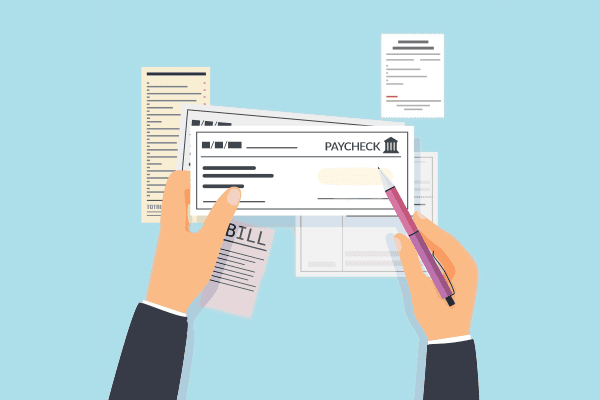Surviving paycheck-to-paycheck in America is simultaneously commonplace and scary. But this doesn’t mean people just scraping by can’t overcome the debt that threatens to swamp them.
All it takes is a good plan and the discipline to see it through.
Which is not the same thing as saying it’ll be easy. The old saw about households being one missed paycheck from disaster still cuts close to the American bone. In 2018, some 27% of adults told the Federal Reserve they couldn’t cover an unexpected $400 expense without borrowing or selling something; another 12% said they couldn’t cover such a bill at all.
Sound familiar? The Fed’s gloomy findings are reinforced by a Charles Schwab survey released in May, in which 59% of adults reported they live paycheck-to-paycheck, and only 38% said they had emergency savings. Interestingly, the Schwab survey also found that we’re far more interested in how our friends spend (57%) than how they save (43%).
» Learn More: How Much Money You Should Save From Each Paycheck
The culprit? Social media: 34% of adults are inspired to spend based on something they saw on social media, with Millennials leading the pack.
In the face of all those bleak statistics, however, there is hope.
Be Optimistic about Dealing with Debt
It can begin with a simple selfie pep talk, says ArrestYourDebt blogger Ryan Luke.
“So many people who are struggling with debt … will go through the motions, but in their minds, they don’t believe they will be successful,” Luke says. “If you can convince yourself you can get out of debt despite your current condition, your potential for success just increased tenfold.”
Know this: Lots of people who were stuck on the financial precipice came back from the brink, and it’s not because they hit the lotto. They did it because they had a burning desire to live differently, to live smarter, to live better.
They decided they wanted to end the stress of living paycheck-to-paycheck more than they wanted the sugar high spending provides.
Then they did the simplest, yet hardest thing anyone riding the paycheck-to-paycheck carousel can do:
- They tracked down every dime that comes in looking for opportunities to enhance their income.
- And they tracked every dime that goes out, looking for leaks: indulgences, impulse buys, outright waste, and so on.
Why You Should Prioritize Budgeting
David Bakke, a MoneyCrashers.com personal finance blogger, suggests a novel way to check for waste. Try a “spending freeze.” Fill the refrigerator and your gas tank. Now see how long you can go without spending another penny.
“This is a great experience,” Bakke says, “which will show you how your minor discretionary spending is affecting your overall financial picture.”
With complete knowledge of their financial landscape, successful debt warriors did what each of the 30 experts we polled for this story said was essential: They developed a no-nonsense budget, the granite foundation on which they constructed their new, improved lives.
“There are two keys to overcoming debt,” says Dock David Treece, senior financial analyst at FitSmallBusiness.com. “Being aware and being strategic.”
We’ve covered awareness. As for strategy, Treece touts, as countless other advisors do, being methodical. Choose a system — pay off lowest balances first and work your way up (snowball method), or attack highest interest-rate balances first, and work your way down (avalanche method) — and be ruthless about its application.
Remember, you’re pursuing the ultimate benefit of budgeting – living without financial stress. Which is why you must keep in mind, of course, the Weight Watchers philosophy.
Weight Watchers? Weight Watchers, which instructs its disciples to chant, “Nothing tastes as good as skinny feels.” For those attempting to break out of their paycheck-to-paycheck rut, it’s “Nothing I purchase can buy peace of mind.”
In fact, there’s plenty Weight Watchers can teach about the attitude needed to whittle away debt a little bit at a time:
- Know your budget and stick to it.
- Don’t quit just because you messed up today.
- A little splurge now and then can help keep you on track.
- Changing bad habits into good ones takes time.
- Celebrate your triumphs, even the little ones.
- Even if the path isn’t straight, keep your eyes on your goal.
“The key to finally overcoming your personal financial issues,” says Phoenix-based Daily Successful Living blogger and MBA Amy White, “is awareness of your spending triggers and financial weak points, and the ability to keep trying over and over again. You have to recommit yourself to your financial goals every single day.”
That’s great diet — er, financial — advice if we ever heard it.
It’s not enough simply to have a plan. Even the best plans get tested. The car breaks down. Someone cracks a tibia and there is an emergency room visit. The roof springs a leak. As former heavyweight champion Mike Tyson said, “Everyone has a plan until they get punched in the mouth.”
Mindset is crucial, says Wendy Terrill, who runs Assurance & Guarantee, an insurance and financial counseling shop in Graham, N.C.
“Before getting out of debt,” she says, “you have to believe it is possible. And let me tell you, it is. … If you exercise self-control … you will be surprised at how far it can take you.”
Yes, but. … Suppose you find self-control elusive? (And who really likes to exercise, anyhow?)
Suppose you find yourself slipping back into bad habits? Suppose, after all your desire and planning and charting and researching, it turns out you simply lack the willpower to go it alone? With no one to answer to but yourself, or perhaps your spouse — and who needs those arguments? — you succumb to impulse purchases, resume your coffee shop routine, rationalize spending because something you really, really want is on sale — what then?
Partner up to Beat Debt
Remember our Weight Watchers example? Sure, the philosophy is all about having a plan, making smart choices, and being patient, but virtually everyone who makes the system work says the same thing: They stick to it because they’re never more than a week from stepping on a scale in front of a real human being, one who knows them, knows their struggle, and is coaching them toward their goal.
In short, successful Weight Watchers have someone — a professional someone — holding them accountable.
When it comes to climbing out of debt, “You need an accountability partner,” says emergency room nurse/personal finance blogger (casamochi.com) Lauren Mochizuki. “You need an accountability partner you trust, who will tell you your behavior is not aligning with your goals.”
Coaches — the common term for accountability partner — are everywhere these days, and personal finance is no exception. Credit counselors representing nonprofit debt management agencies, such as InCharge Debt Solutions, are professional accountability partners with valuable knowledge, training, and experience about conquering debt paycheck-to-paycheck.
Credit Counseling can help you set your goals, your timetables, and your methods. A credit counselor can help you keep on your path, and recommend useful ways forward when you hit those inevitable tough patches.
And if it turns out your predicament, combined with your stress management, are simply too much to manage without intervention, a credit counselor can guide you into a debt management plan that puts your finances on autopilot until you are debt-free, usually three to five years.
Yes, there’s a whole lot of paycheck-to-paycheck living going on in America these days. (No wonder we’re edgy.) If you’ve read this far, it’s clear you burn with the desire to mold a different future.
That’s step No. 1. Now, get a plan, a mindset, and a coach.
And get busy!

6 MINUTE READ
Home » InCharge Blog »
Sources:
- NA (2019, May) Report on the Economic Well-Being of U.S. Households in 2018 — May 2019. Retrieved from https://www.federalreserve.gov/publications/2019-economic-well-being-of-us-households-in-2018-executive-summary.htm
- Brockman, K. (2019, August 14) Most Americans are living paycheck to paycheck, survey shows. Retrieved from https://www.usatoday.com/story/money/2019/08/14/paycheck-to-paycheck-most-americans-struggle-financially-survey-says/39940123/
- Leonhardt, M. (2019, May 13) 62% of millennials say they’re living paycheck to paycheck. Retrieved from https://www.cnbc.com/2019/05/10/62-percent-of-millennials-say-they-are-living-paycheck-to-paycheck.html
- NA (2019, May) Modern Wealth Survey. Retrieved from https://content.schwab.com/web/retail/public/about-schwab/Charles-Schwab-2019-Modern-Wealth-Survey-findings-0519-9JBP.pdf
- Paquette, D. (2018, December 29) Living paycheck to paycheck is disturbingly common: ‘I see no way out.’ Retrieved from https://www.washingtonpost.com/business/2018/12/28/living-paycheck-paycheck-is-disturbingly-common-i-see-no-way-out/
- Milligan, S. (2019, January 11) Stretched Thin: The continuing government shutdown highlights the fact that most Americans have little to no savings. Retrieved from https://www.usnews.com/news/the-report/articles/2019-01-11/stretched-thin-majority-of-americans-live-paycheck-to-paycheck
- Irby, L. (2019, February 6) How to Stop Living Paycheck to Paycheck. Retrieved from https://www.thebalance.com/stop-living-paycheck-to-paycheck-960033

















